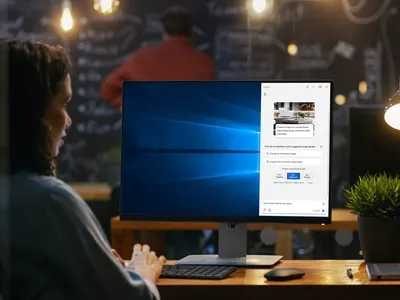
How to Recover deleted pictures on iPhone 12 Pro? 5 Best Solutions | Stellar

How to Recover deleted pictures on iPhone? 5 Best Solutions
For many iPhone users, photos are the most important data stored on their device – so losing those photos can be a disaster.
However, even if you accidentally deleted some or all of your pictures on iPhone, you can get them back.
We’ll discuss how to recover deleted photos on your iPhone with or without backup.
How to Recover Deleted Pictures on iPhone?
There are five best solutions to recover deleted pictures on iPhone. Use the solution that fits your needs and helps you recover your lost pictures.
1. Recover Deleted Pictures on iPhone from Recently Deleted Albums
Pictures taken with the iPhone Camera application are saved by default in the Photos application. If a photo or video is deleted, it’s moved to the Recently Deleted folder in the Photos app. This folder is the same as your computer’s Recycle Bin and retains the deleted photos for 30 days. Once this period expires, your photos are permanently deleted from this folder. Perform these steps if you want to recover recently deleted photos on your iPhone:
- Open the Photos app.
- Tap on Albums at the bottom.
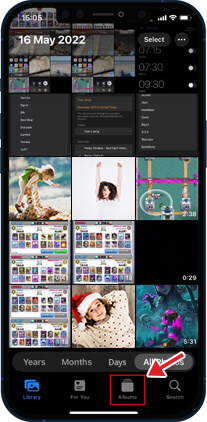
- Scroll down to find the Recently Deleted folder.
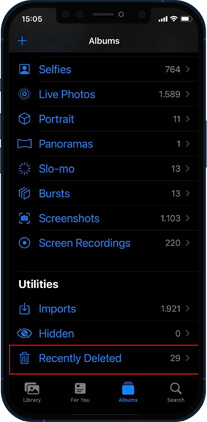
- Tap on the Select option at the top-right corner of the screen.
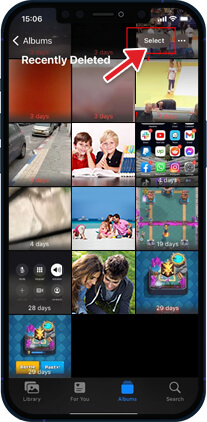
- Select the deleted photos you want to recover on your iPhone.
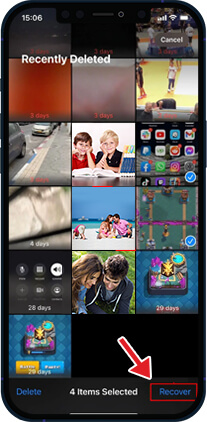
- Now, tap Recover, and the pictures will be returned to their original iPhone albums.
Note – If you want to restore all the deleted photos from your Recently Deleted folder, tap on the Recover All button.
How to Recover Deleted Pictures on iPhone From a Backup?
If your photos are not in the Recently Deleted folder, you might get them back by restoring your iPhone from a previous backup. There are three ways to restore deleted photos on iPhone – iCloud website, iTunes backup, or Finder.
When recovering photos from your iPhone from backup, pay attention to the date of creation of your backups. Use the most recent backup but don’t delete all older backups. It’s always good to have multiple backups if something goes wrong.
2. Recover Photos on iPhone using iCloud via the iCloud website
Apple’s iCloud Backup helps you recover deleted photos from your iPhone to your system. For iCloud to automatically back up all your pictures and videos, you must first set up and enable iCloud Photos on your device. Here’s how to enable iCloud Photos to Backup all your photos:
- Open the Settings app on your iPhone.
- Tap iCloud and then go to Photos.
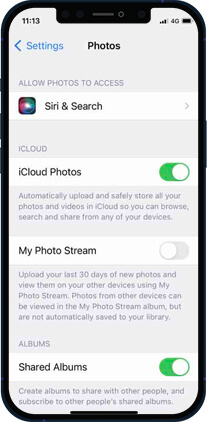
- Toggle on iCloud Photos to enable it.
To restore photos from iCloud, follow these steps:
- Go to the iCloud Website and log in with your Apple credentials.
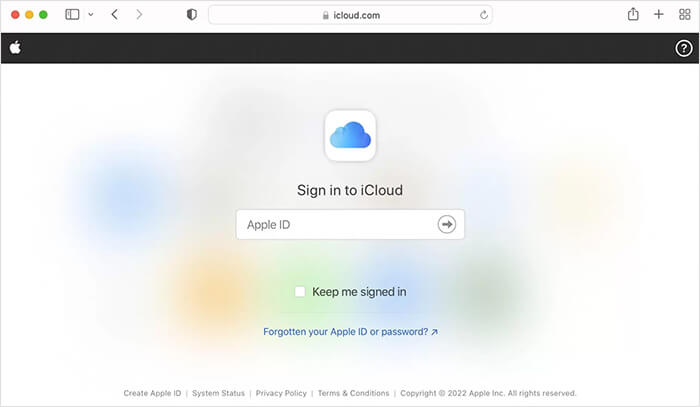
- Once logged in, select ‘Photos’ from the app list.
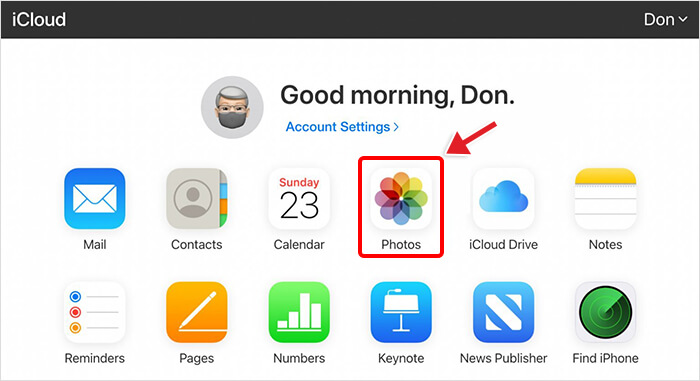
- Go to Recently Deleted Album, select the photos you wish to restore, and click Recover.
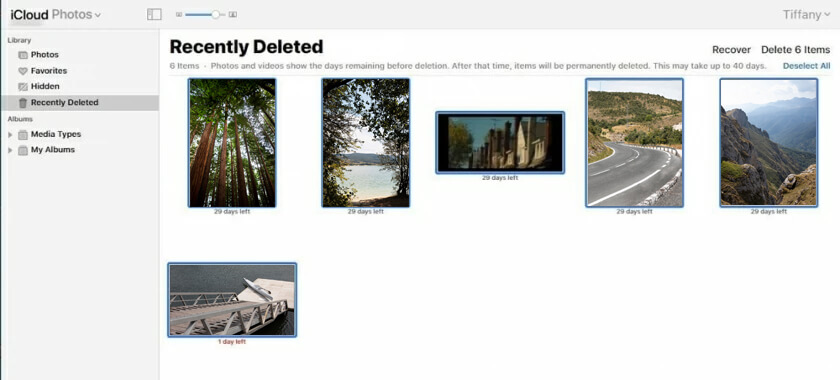
3. Recover Photos on iPhone using iTunes
Many iPhone users use iTunes backup to recover their deleted photos and videos. This Apple’s proprietary tool syncs your iPhone files to your PC or Mac. Follow the steps to recover deleted photos from iTunes backup:
- Connect your iPhone to your Mac system with macOS Mojave or an earlier version.
- Click on the iPhone icon at the upper-left corner of your iTunes window.
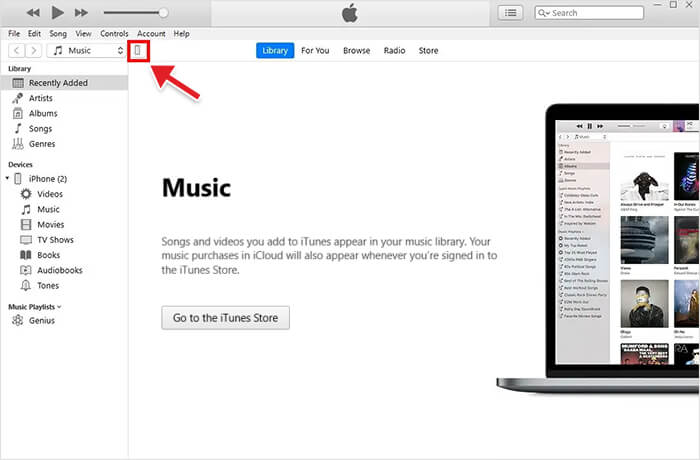
- Click the Summary tab in the left pane.
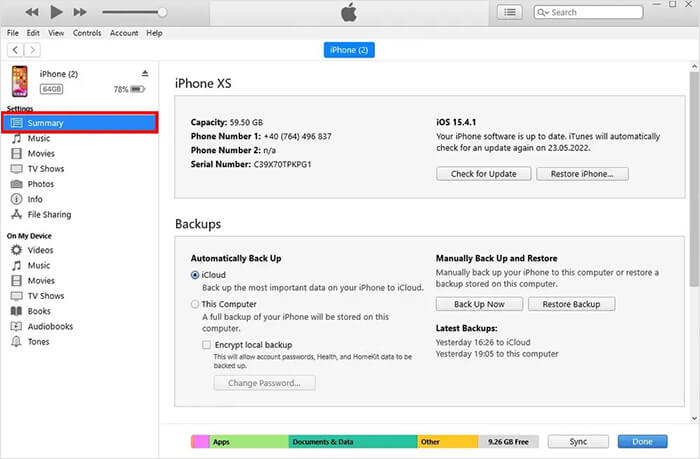
- Now in the Backups section, click on Restore Backup.
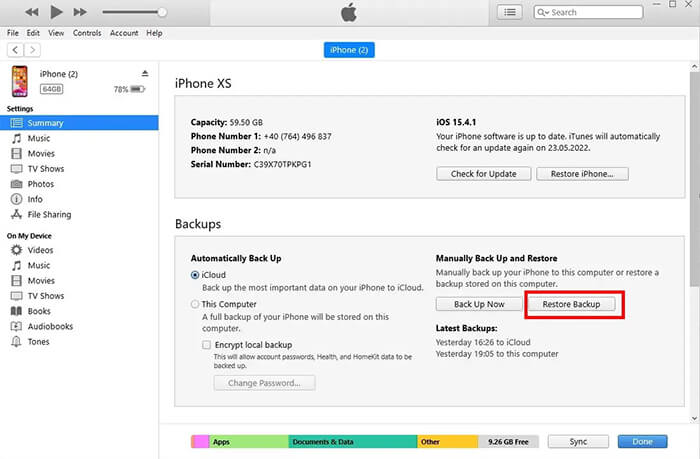
- Select the backup you want your phone to use.
Note - macOS Mojave is the last version of Apple’s OS to ship with iTunes. In macOS Catalina and newer version, iTunes is split into different apps: Podcasts, Books, TV, and Music. Moreover, Finder is used to manage and sync content on your iPhone, iPad, and iPod touch.
- Once the restoration process is complete, check the Photos app to see if the deleted photos were recovered. If not, try repeating the process and return to the most recent backup or choose an older backup.
4. Recover Deleted Pictures on iPhone using Finder
To restore the pictures on iPhone using Finder in macOS Catalina 10.15 or above, follow these steps:
- Open Finder on your Mac with macOS Catalina 10.15 or above.
- Connect your iPhone to your Mac system.
- Select your iPhone from the location lists on the left.
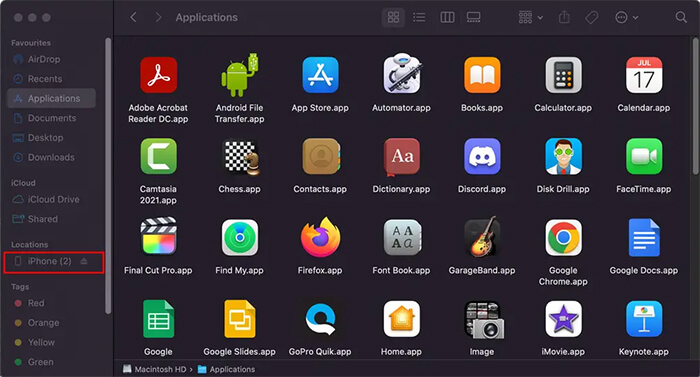
- Navigate to the General tab and click Restore Backup.
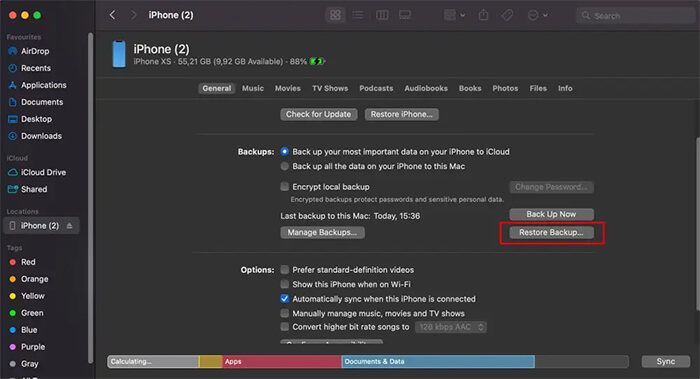
- Select the backup date you like to use for restoring.
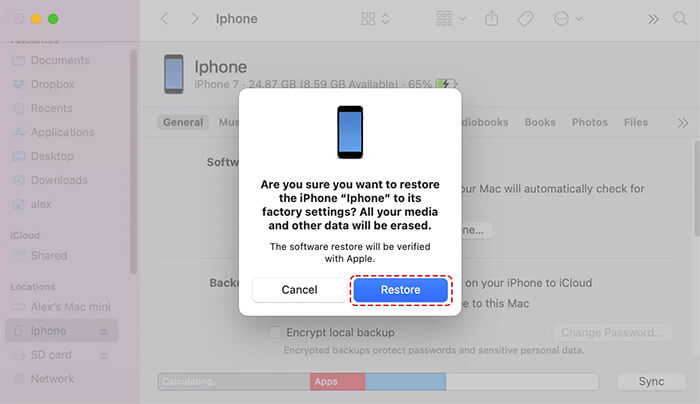
- Click the Restore button to confirm.
How to Recover Pictures on iPhone without Backup?
What to do if there is no iPhone backup or you cannot restore pictures using iCloud or iTunes? Use iPhone data recovery software to restore lost iPhone pictures.
Stellar Data Recovery for iPhone can find and restore deleted/lost pictures, videos, chat messages, audio, contacts, etc., from your iPhone/iPad/iPod touch. This software is easy to use when restoring deleted photos, and you can operate it even if you don’t have technical knowledge. Follow the steps to discover how to use software to recover deleted photos:
- Connect your iPhone to your computer.
- Download Stellar Data Recovery for iPhone on your PC or Mac.
- Select Recover from iPhone on the main screen of the software.
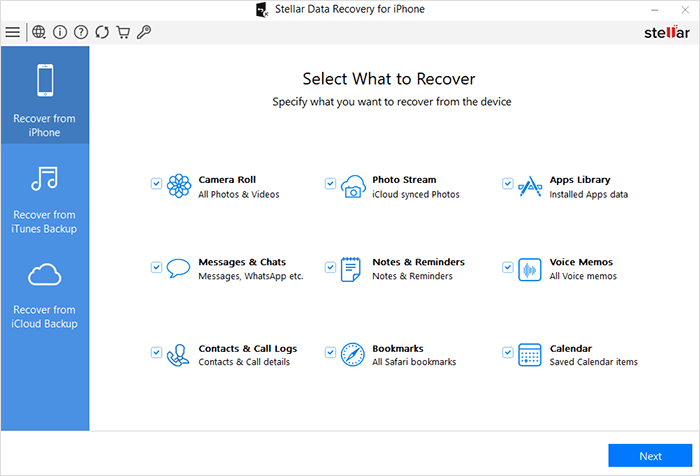
- Select the data type and click Next. The scanning process will start.
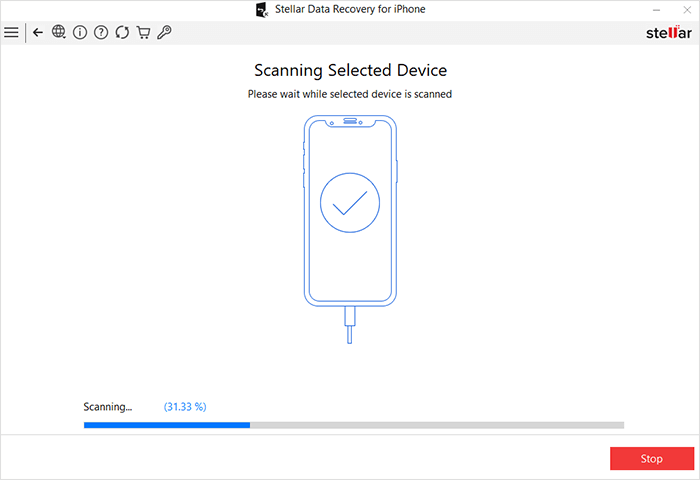
- Once the scanning is completed, preview the data. Select the recovered data you want to restore and click Save.
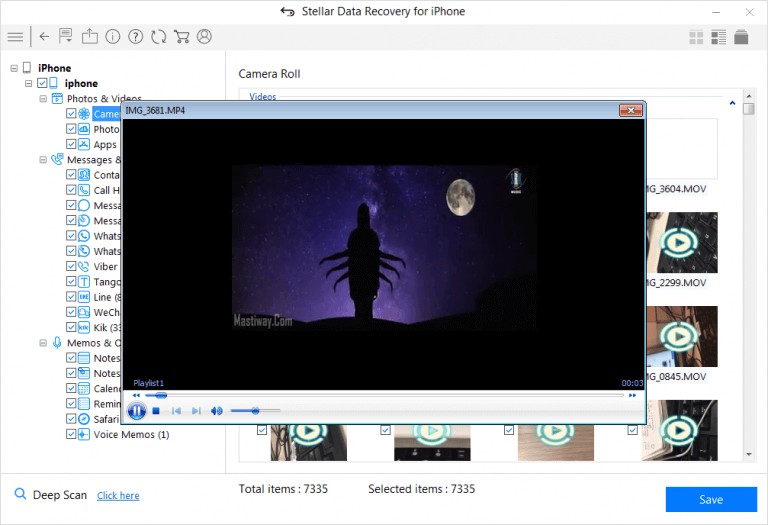
- Choose the destination to save the recovered data.
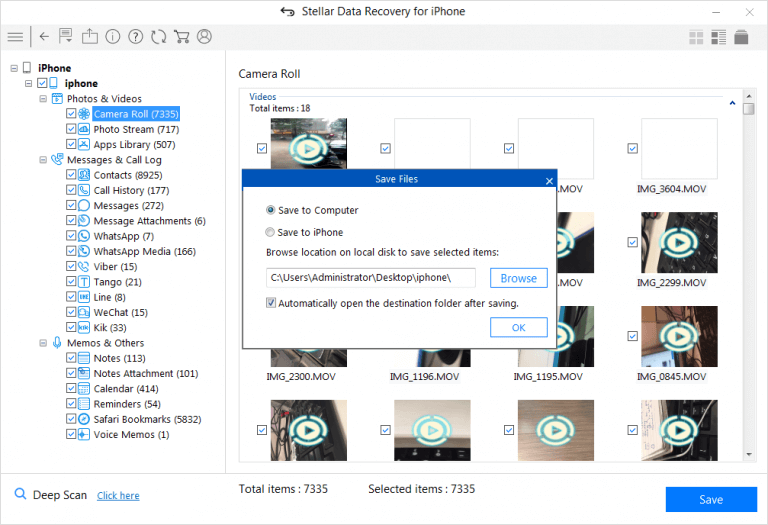
Conclusion
The data loss issues in Apple can be resolved easily through multiple backup solutions — iTunes, iCloud, and iCloud.com. However, these native backup recovery solutions fall short when you need to recover specific data, though you can easily recover deleted photos in your iPhone from these backup options. However, you will also end up replacing every existing data on your device!
Stellar Data Recovery for iPhone fills this gap quite efficiently. It recovers your deleted photos in water damage, jailbreak, factory reset, Black Screen of Death, etc. In addition, this software has an exceptionally high data recovery success rate, making it an essential utility for iPhone users.
Apple will delete your photos in July. Here’s what you should do
Apple has recently announced that it will permanently delete photos from its users’ ‘My Photo Stream’ this month. This news has come as a surprise to the Apple community, as users struggle to understand the implications of this announcement and what necessary precautions can be taken. In this blog post, we will get into the details of this new move by Apple, explore the reasons behind it, and provide tips on how iPhone/iPad/Mac users can safeguard their precious photos.
The Announcement
_”_My Photo Stream is scheduled to be shut down on July 26, 2023. As part of this transition, new photo uploads to My Photo Stream from your devices will stop one month before, on June 26, 2023.
The photos in My Photo Stream are already stored on at least one of your devices, so as long as you have the device with your originals, you won’t lose any photos as part of this process. If a photo you want isn’t already in your Library on a particular iPhone, iPad, or Mac, make sure that you save it to your Library on that device…” Read more
What is Apple’s My Photo Stream?
My Photo Stream, launched in 2011, was designed to sync photos across multiple Apple devices such as iPhone, iPad, or Mac.
This feature automatically stores your most recent pictures (up to 1000) for approx. 30 days so you can view and download them easily from other Apple devices. After this period, photos are removed from My Photo Stream but remain in your device’s Photos app. However, this only shows photos and not your live images or videos.
How to Protect Your ‘My Photo Stream’ Pictures?
Apple, known for its commitment to user privacy and data security, has recommended several preventive measures to mitigate the risk of losing any important photo due to this update.
1. Move My Photo Stream images to your Library
Even if the pictures in My Photo Stream are already there on at least one of your Apple devices, you must save these pictures to your Photo Library to avoid losing them**.** Here’s how to copy My Photo Stream pictures to your Photo Library:
On your iPhone, iPad, or iPod Touch:
- Open the Photos app and tap Albums.
- Tap on My Photo Stream > Select.
- Select all the photos you want to save, then tap the Share button > Save Image.
On your Mac:
- Open the Photos app and then open the My Photo Stream
- Select the photos you want to save which aren’t currently in your photo library.
- Drag and drop them from the My Photo Stream album into your Library.
2. Move to iCloud Photos
To preserve your My Photo Stream images in their original and high-resolution version, you can transfer them to iCloud Photos.
If you already have an iCloud account, just enable iCloud Photos to automatically upload & sync every photo and video you capture on the device, making them accessible from anywhere.
To use the iCloud Photos service, you will require the following:
- iPhone running iOS 8.3 or later version.
- iPad with iPadOS 8.3 or later version.
- Mac running OS X Yosemite or later version.
How to set up iCloud Photos on your iPhone, iPad, or iPod touch?
- On your iPhone, iPad, or iPod touch, go to Settings.
- Next, click on [Your Name] > iCloud.
- Tap on Photos and do the following:
For iOS 16, iPadOS 16, or later versions: Toggle on the ‘Sync this [device]‘ option.
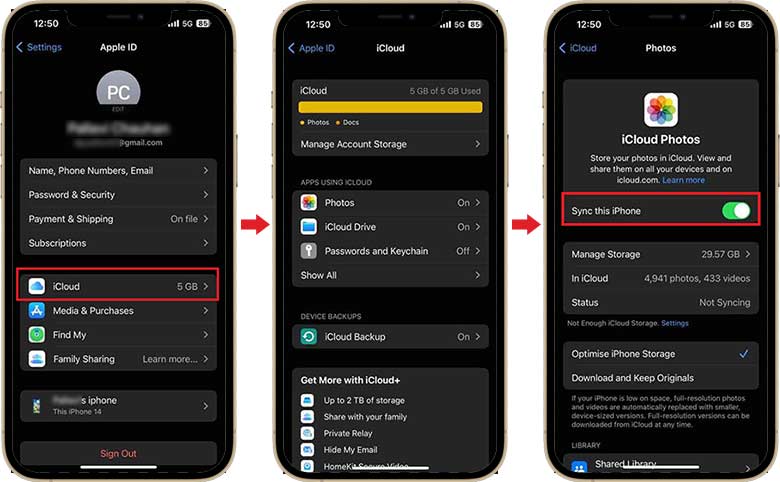
For iOS 15, iPadOS 15, or earlier versions: Turn on the iCloud Photos
How to set up iCloud Photos on your Mac?
- On your Mac, go to Apple Menu and click on System Preferences.
- Click Apple ID and then select iCloud in the sidebar.
- Now, select Photos and turn on the switch next to Sync this Mac.
**
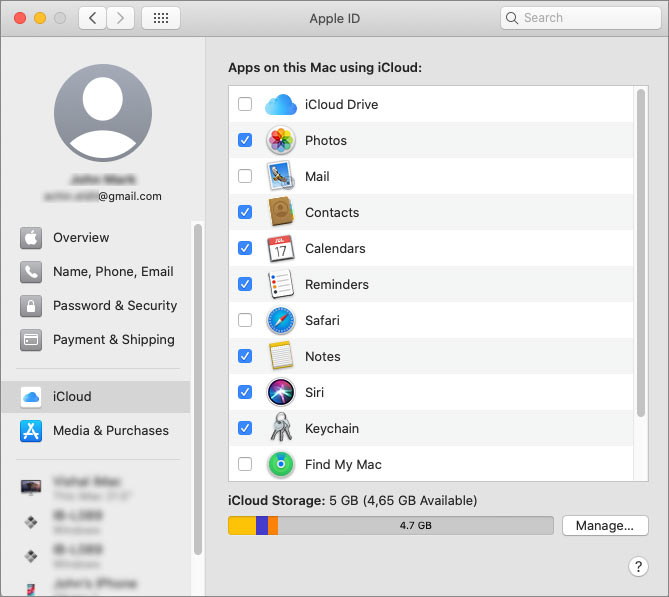
**
Don’t want to use iCloud Photos?
While iCloud Photos is a convenient option for many Apple users, it’s important to acknowledge that it is not the best fit for everyone. Limited free storage of 5GB or lack of cross-platform compatibility can compel Apple users to look for other alternatives.
Storage options, such as Google Photos, Microsoft OneDrive, Dropbox, external hard drives, etc., are available to ensure your iPhone Photos are safe and easily accessible.
The Bottom Line
Apple’s announcement of the potential discontinuation of My Photo Stream has understandably caused worry among its users. While a specific reason for this action remains undisclosed, they are actively addressing the issue to prevent data loss. In the meantime, iPhone users must take precautionary measures to safeguard their photos. They can simply move the My Photo Stream images to the Photo Library, iCloud Photos, or other backup folders.
How to Reset iPhone without Losing Data?
Summary: Sometimes, resetting an iPhone is essential to fix minor issues like iPhone crashing, freezing, or getting stuck at the Apple logo. But the iPhone reset process can delete important data and settings on your device. Read this post to learn smart ways to reset your iPhone without data loss. Moreover, you can also download this quick tool to reset your iPhone without losing data.
“Yesterday, my iPhone stopped working suddenly. I have been trying multiple ways to fix it since then; even tried the force reboot method. Should I simply reset my iPhone? How do I do it without losing my device data?”
Resetting an iPhone can sometimes become a necessity, whether due to sudden freezing up of your device, software glitches, or slow performance. Often, when your iPhone gets stuck on the Apple logo or suddenly crashes, you can reset your iPhone to fix this minor issue.
A factory reset is also necessary if you want to sell your iPhone and want to start fresh. When resetting your iPhone, it will become an empty slate with no pictures, contacts, videos, downloaded applications, playlists, or anything else. An iPhone reset restores your iPhone to its initial configuration and original factory settings.
However, be careful with this method as resetting your iPhone deletes all files & settings on the device. For those looking to reset iPhone without losing their precious data, this blog is the answer. Let’s read on to find some simple ways to do so while keeping our data intact.
How to reset your iPhone without Losing Data?
Before starting, it’s crucial to back up your iPhone data to avoid losing important files and folders. You can back up your iPhone using iCloud, iTunes, or Finder on Mac or PC.
Next, follow the step-by-step instructions on resetting an iPhone using iPhone Settings, iPhone erasure software, and iTunes.
Method 1: Reset iPhone Without Losing Data via Settings
To reset iPhone without losing data, you need to use the ‘Reset’ feature in your iPhone. This feature has different options on how you would like to reset- whether through the ‘Reset All Settings’ or the ‘Reset Network Settings’ option.
The Reset All Settings option will remove or reset privacy settings, keyword dictionary, location settings, etc., to default. At the same time, Reset Network Settings will remove previously used networks and VPN settings. Resetting the Network Settings will turn off the cellular data roaming and remove previously used Wi-Fi settings of your iPhone.
Moreover, no data or media is deleted from iPhone when choosing the Reset All Settings or Reset Network Settings option.
Steps to Reset iPhone Using the ‘Reset All Settings’ option
- On the iPhone, navigate to Settings > General.
- Tap on Transfer or Reset iPhone.
- Click Reset options.

- Next, click the Reset All Settings option.
- Then enter the iPhone passcode.
- Now, click Reset All Settings. This process will take a couple of minutes to reset the privacy settings, keyword dictionary, location settings to default, but will keep the rest of your data fully secure.

Method 2: Reset iPhone via Stellar Toolkit for iPhone Tool
Sometimes, the ‘Reset All Settings’ option doesn’t solve your iPhone issue. In such a case, try resetting the iPhone with the help of trusted software. Stellar Toolkit for iPhone is a secure and professional tool that can help you reset your iPhone to fix various iOS issues without losing data.
Also, you can also use Stellar Toolkit for iPhone to fix iOS related issues like- iPhone crashing, stuck at the Apple logo, etc.
This tool’s ‘Repair iPhone’ feature will first download the fresh copy of the iOS version present in your device from the official website. Then it will install the freshly downloaded iOS version on your iPhone after removing the existing one from your device. The software will reset your iPhone, making it seem new without removing or deleting your data.
Stellar Toolkit for iPhone is compatible with the latest iPhone 14, 13, 12, and below series and even all iPad versions, such as iPad Air, iPad Mini, and others.
Step-by-Step: How to reset iPhone with Stellar Toolkit for iPhone:
Step 1: Download Stellar Toolkit for iPhone on your Mac or Windows PC and connect your iPhone to the system using a USB cable.
Step 2: Select Repair iPhone module from the launch screen of the software.

Step 3: On the Repair iPhone screen, click the Next button.

Step 4: Click on the iPhone icon.
Step 5: Click the Download button to download the latest iOS or iPadOS version of the firmware file. If you have already downloaded the firmware before, select Import.

Step 6: After downloading the firmware file, click the Repair button to start repairing.

Step 7: Once you receive the message —The repairing process of the selected iOS device is completed, click OK.

Restart your iPhone to see if the iOS issues are resolved.
Method 3: Reset iPhone Without Losing Data via Recovery Mode
To reset your iPhone, you can use iTunes or Finder app. You need to use Mac or Windows PC to access the recovery mode of your iPhone and reset the device. This method will erase all your device data, so take a backup of your iPhone before proceeding.
Steps to reset iPhone via Recovery
- Open iTunes on your Mac or Windows system.
- Connect your iPhone to the computer and then put your iPhone into Recovery Mode .
- Once your device has entered the Recovery Mode, a message ‘you’re in Recovery Mode’ will pop up. Click OK.

- Click on your iPhone when it appears in iTunes, then click Summary.
- Now, select the “Restore iPhone” option on the right pane.

- Click Restore to confirm. It might take a while for your iPhone to reset; don’t disconnect your device from the computer until the reset process is completed.

- Once the restore process is complete, set up your iPhone as new or restore it from a backup.
Conclusion
You can factory reset your iPhone without fearing data loss by trying different methods mentioned in this blog. Reset All Settings/ Reset Network Settings feature of iPhone can reset your device; however, it may not always work. You can even use iTunes to reset your iPhone, but you will lose all your device data.
Or use the ‘Repair iPhone’ feature of Stellar Toolkit for iPhone software to permanently reset your iPhone without losing data. This tool can repair iOS issues like iPhone crashing, Black Screen of Death, and iPhone stuck at the Apple logo.
Download the free trial version to evaluate the features of the software.
FAQs
How to remotely erase iPhone data?
If your iPhone is lost or stolen, you can protect your iPhone data from misuse by remotely erasing its data using the iCloud website.
How to restore or set up your iPhone after reset?
Use an iCloud backup to restore your iPhone after a factory reset.
Forgot iPhone Password? – Here are the Best Solutions
Summary: Can’t remember your iPhone password? This post brings the best solutions to fix forgotten password issue and restore your data from the locked iPhone.
Setting up a password on your iPhone is a great way to keep unauthorized access at bay but what if you forget the password? On a positive note, you can still access or restore your iPhone Data and this blog highlights some best solutions for forgotten iPhone password.
Password enabled iPhone ensures that no one can access it without your permission and is a great way to stop prying eyes from accessing your personal data. But what if you itself forget the password? Isn’t that a problematic situation? Obviously, as you cannot unlock your iPhone and access the data. Further, if you enter the wrong password six times, then a message is displayed stating that the iPhone has been disabled.
 Figure 1. If you enter the wrong password six times in a row, then a message will be displayed stating that your iPhone has been disabled.
Figure 1. If you enter the wrong password six times in a row, then a message will be displayed stating that your iPhone has been disabled.
If you’re lucky then you might be able to unlock your iPhone and access the data stored on it else there is a probability that you may end up losing your data in the process of unlocking it.
Forgot iPhone passcode? What to do next?
Alright, I know it’s next to impossible that you will ever forget your passcode but we cannot overlook the fact that, yes there is a chance that you may forget it. The majority of us will say that we use fingerprint identity sensor (Touch ID) and hardly use a numeric passcode. Well, suppose your Touch ID stops working properly and to fix it you need to go to Settings < Touch ID & Passcode < Enter the Passcode.
Wait! What! You need to enter the passcode to get the Touch ID working again and you thought that you’d never need to remember the passcode. If you have a backup of your data, then all you have to do is simply reset your iPhone and restore your data from the backup. Unfortunately, you’ll only restore data that has been backed up and any new data added after that won’t be there. That said, let’s delve into some of the best solutions for forgotten iPhone password.
If you’ve forgotten the password, these options will help you out:
- Erase your iOS device with iTunes to remove the password
- Erase the passcode with iCloud
- Use Recovery mode if you’re unable to connect to either iCloud or iTunes
- Leverage an iPhone data recovery to recover deleted/lost data
Erase your iPhone with iTunes, restore files from it and remove the passcode
If you’ve synced your iPhone with iTunes, you can restore your files from it. Further, this will erase all the data and the passcode. To restore your data and remove the passcode, follow these steps:
i. Connect your iPhone to your computer and launch iTunes
ii. If you’re asked for the passcode, try another computer with which you’ve synced your iPhone, else proceed with either iCloud or Recovery mode
iii. Sync your iPhone with iTunes and make a backup of it
iv. On your iPhone set up the screen, choose Restore from iTunes backup
v. In iTunes select your iPhone and select the relevant backup
This process will restore all your data on iPhone. Now, configure a new passcode and never forget it.

Figure 2 illustrates to erase the data & passcode and to restore your iPhone
Erase the passcode with iCloud
Follow these steps to erase the passcode of your iPhone with iCloud:
i. Go to iCloud.com and sign in with your valid Apple credentials to view the iCloud dashboard.
ii. At the top of the dashboard, select ‘All Devices’ and select your iPhone from the given list
iii. Click on ‘Erase’ to erase the passcode
iv. On the setup screen on your iPhone, choose the restore from a backup option to restore files from the iCloud backup
Important: You can erase your iPhone with Find My iPhone as long as it is connected to a Wi-Fi or cellular network.
Use Recovery mode to erase the passcode
If you’ve never synced your iPhone with iTunes or iCloud, then you need to erase the passcode in the Recovery mode. Follow these steps to erase the passcode:
i. Connect your iPhone to your system and force restart it. Different versions of iPhone have different settings; therefore, follow these settings depending on your iPhone
- iPhone 8/8 Plus: Press and release the Volume up button and then quickly press and release the Volume down button. Press and hold the Side button until the recovery mode screen appears
- iPhone 7/7 Plus: Press and keep holding both the Side and Volume down buttons until you see the recovery mode screen
- iPhone 6S and earlier: Press and keep holding the Home and the Side buttons until the recovery mode screen appears
ii. Finally, after restarting the iPhone, select Restore from the given options

Figure 3 illustrates to restore iPhone via recovery mode
iii. Wait for the process to finish and then restore your files to your iPhone and set up a new passcode
Get more help
If due to any reason you lose your data stored on iPhone during the whole process, then you can utilize an iPhone data recovery software and recover all your lost data. Stellar Data Recovery for iPhone is a robust iPhone data recovery software which efficiently brings back all your lost data. Moreover, the software facilitates three recovery option namely:
- Recover from iPhone
- Recover from iTunes Backup
- Recover from iCloud backup
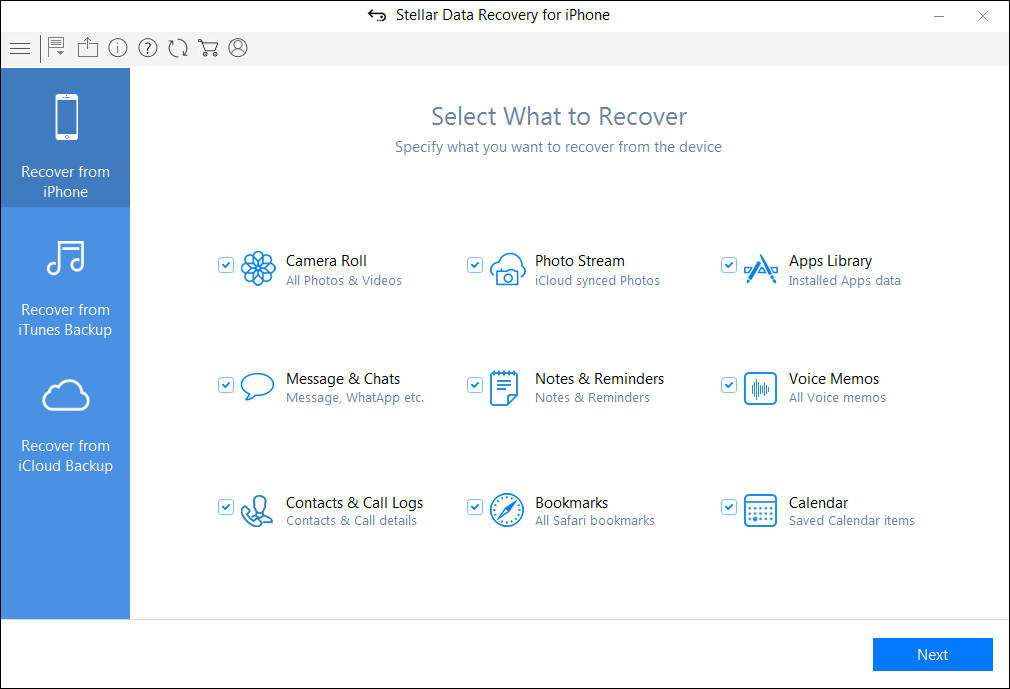
Figure 3 illustrates the home screen of Stellar Data Recovery for iPhone software
At Last
After restoring your iPhone , make sure that you never ever forget the passcode. The key is to create a strong passcode which is easy to remember. Further, if your iPhone gets stuck in recovery mode or due to any reason you’re unable to unlock your device, contact Apple support or visit the nearest service centre.
- Title: How to Recover deleted pictures on iPhone 12 Pro? 5 Best Solutions | Stellar
- Author: Nova
- Created at : 2024-08-20 20:03:02
- Updated at : 2024-08-21 20:03:02
- Link: https://blog-min.techidaily.com/how-to-recover-deleted-pictures-on-iphone-12-pro-5-best-solutions-stellar-by-stellar-data-recovery-ios-iphone-data-recovery/
- License: This work is licensed under CC BY-NC-SA 4.0.









